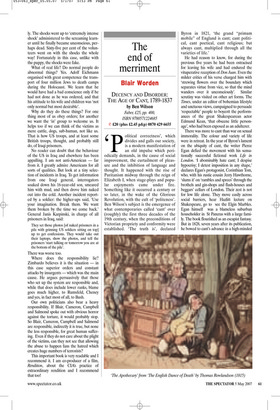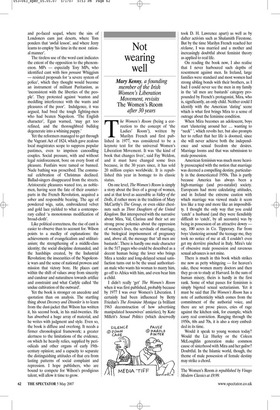The end of merriment
Blair Worden
DECENCY AND DISORDER: THE AGE OF CANT, 1789-1837 by Ben Wilson Faber, £25, pp. 400, ISBN 9780571224685 ✆ £20 (plus £2.45 p&p) 0870 429 6655 ‘Political correctness’, which divides and galls our society, is a modern manifestation of an old impulse which periodically demands, in the cause of social improvement, the curtailment of pleasure and the inhibition of language and thought. It happened with the rise of Puritanism midway through the reign of Elizabeth I, when stage-plays and popular enjoyments came under fire. Something like it occurred a century or so later, in the wake of the Glorious Revolution, with the cult of ‘politeness’. Ben Wilson’s subject is the emergence of what contemporaries called ‘cant’ over (roughly) the first three decades of the 19th century, when the preconditions of Victorian propriety and conformity were established. ‘The truth is’, declared Byron in 1821, ‘the grand “primum mobile” of England is cant; cant political, cant poetical, cant religious; but always cant, multiplied through all the varieties of life.’ He had reason to know, for during the previous five years he had been ostracised for leaving his wife and had endured the vituperative reception of Don Juan. Even the milder critics of his verse charged him with ‘strewing flowers over the boundary which separates virtue from vice, so that the mind wanders over it unconsciously’. Similar scrutiny was visited on other art forms. The Times, under an editor of bohemian lifestyle and unctuous views, campaigned to persuade ‘respectable’ people to boycott the performances of the great Shakespearean actor Edmund Kean, ‘that obscene little personage’, who had been exposed as an adulterer.
There was more to cant than war on sexual immorality. The colour and variety of life were in retreat. In the year of Byron’s lament on the ubiquity of cant, the writer Pierce Egan defied the movement with his sensationally successful fictional work Life in London. ‘I abominably hate cant; I despise hypocrisy; I detest imposition in any shape,’ declares Egan’s protagonist, Corinthian Tom, who, with his rustic cousin Jerry Hawthorne, ‘slums it’ on ‘rambles and sprees’ through the brothels and gin-shops and flash-houses and beggars’ cellars of London. Their zest is not for low life alone. They move easily across social barriers, hear Hazlitt lecture on Shakespeare, go to see the Elgin Marbles. Egan himself was a blameless suburban householder in St Pancras with a large family. The book flourished as an escapist fantasy. But in 1828, seven years after its publication, he bowed to cant’s advance in a high-minded and po-faced sequel, where the sins of Londoners earn just deserts, where Tom ponders that ‘awful lesson’, and where Jerry learns to employ ‘his time in the most rational manner’.
The tireless use of the word cant indicates the extent of the opposition to the phenomenon. MPs — especially Tory MPs, who identified cant with bien pensant Whiggism — resisted proposals for ‘a severe system of police’, which they thought would become an instrument of militant Puritanism, as ‘inconsistent with the liberties of the people’. They protested against ‘wanton and meddling interference with the wants and pleasures of the poor’. Indulgence, it was argued, had bred the tough fighting-men who had beaten Napoleon. ‘The English character’, Egan warned, ‘may get too refined, and the thoroughbred bulldog degenerate into a whining puppy.’ Yet the reformers managed to get through the Vagrant Act of 1824, which gave zealous local magistrates scope to suppress popular pastimes, even to imprison canoodling couples. Social pressure, with and without legal reinforcement, bore on every front of pleasure. Funfairs were tamed or banned. Nude bathing was proscribed. The communal celebration of Christmas declined. Ballad-singers disappeared from the streets. Aristocratic pleasures waned too, as noblemen, having seen the fate of their counterparts in the French Revolution, acquired a sober and responsible bearing. The age of powdered wigs, satin, embroidered velvet and gold lace yielded to what a contemporary called ‘a monotonous modification of broad-cloth’.
Like political correctness, the rise of cant is easier to observe than to account for. Wilson points to a medley of explanations: the achievements of evangelicalism and utilitarianism; the strengthening of a middle-class identity; the social discipline demanded, and the hardships created, by the Industrial Revolution; the insecurities of the Napoleonic wars and the sense of national prowess and mission that victory bore. He places cant within the shift of values away from sincerity and candour and naturalness towards artifice and constraint and what Carlyle called ‘the undue cultivation of the outward’.
Yet the book is stronger on anecdote and quotation than on analysis. The startling thing about Decency and Disorder is to learn from the dust-jacket that Wilson has written it, his second book, in his mid-twenties. He has absorbed a huge array of material, and he writes with judgment and style. Even so, the book is diffuse and overlong. It needs a firmer chronological framework; a greater alertness to the limitations of the evidence, on which he heavily relies, supplied by periodicals and other organs of early 19thcentury opinion; and a capacity to separate the distinguishing attitudes of that era from lasting patterns of social complaint and repression. I hope publishers, who are bound to compete for Wilson’s prodigious talent, will allow it time to grow.



































































































 Previous page
Previous page